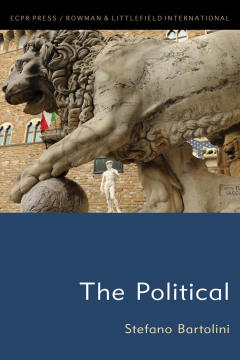
Additional Information
Book Details
Abstract
‘Politics’ is a noun that points to a field or sphere of human activity and interaction. ‘Political’ is an adjective that usually associates with other names to qualify and specify them. Political behaviour, political institutions, political participation and political groups denote special kinds of behaviour, institutions, participation and groups whose specialty resides in their being 'political'. What does this specification refer to? This is the question that this book aims to answer.
The book unpacks the 'politics' understood as the production and distribution of 'behavioural compliance,’ as opposed to the view of politics as a distribution of values, an aggregation of preferences or a solution to social dilemmas. Starting from a motivational definition of elementary political action, the endeavour proceeds to a differentiation of compliance instigations in different social fields of interaction, characterised by various levels of confinement of the actors and of monopolisation of command.
Stefano Bartolini is ‘Peter Mair’ Professor of Comparative Politics at the European University Institute
Stefano Bartolini explains the 'political' in its true essential sense -- he does not measure it, count it, or make it a sub-category of the 'economic'. And in the current circumstance of Europe, the United States and what we once called the West, this approach is doubly rewarding, even urgent. This relatively slim book has the feel and gravitas of an instant classic.
Joseph Weiler, European Union Jean Monnet Chaired Professor
Bartolini’s investigation is a fundamental inquiry into the concept of politics. It is an ontological investigation in the sense that it ventures to identify and characterize objects and facts in the world scholars may want to qualify as political, but not yet with the intent to derive testable hypotheses about empirically observable political processes. As such, it provides constitutive prolegomena for the substantive study of politics. Anyone who ventures to devise new fundamental theorems about politics, or aspires to propose new and counter-intuitive empirical propositions about politics, will read this analytically incisive study with great benefit. It will stimulate your creativity and conceptual attentiveness.
Herbert P. Kitschelt, George V. Allen Professor of International Relations, Duke University
The Political is a tour de force. It develops an entirely original and succinct new definition of the political as ‘nuclear’ political action. Bartolini’s masterful book is a profound disquisition on the very nature of politics and the foundations of political order. It rethinks the political from the ground-up while challenging much of the received wisdom in political science with clarity and elegance. A must-read for political scientists.
Vivien A. Schmidt, Jean Monnet Professor of European Integration and Professor of Political Science and International Relations, Pardee School of Global Studies, Boston University
Varieties of Empathy is a straightforward philosophical book about ethics, and despite the title, little content is devoted in a practical sense to ethical actions toward animals. Aaltola (Univ. of Eastern Finland) takes readers through the problems that lie behind human views of animals. Present here is the danger of anthropocentricism: seeing animals as being like humans and interpreting animals' actions through the lens of what people would feel or do. But Aaltola feels strongly that cognitive empathy, or thinking about animals’ minds, does not lead to true care. Instead, she sees affective empathy, or feeling for an animal, as central to true consideration and introduces the idea of the psychopath as someone who understands the feelings of others but is simply not affected by them. In the end, she suggests, what people truly need is higher-order reflective empathy, which helps limit the influence of culture and politics and guide the use of cognitive and affective empathy. Thus, this work is not an outline of correct actions but a guide to how people ought to feel as a foundation for those actions.
Summing Up: Recommended. Graduate students, researchers, and faculty.
This is an ambitious book that engages fundamental issues in the study of politics. Bartolini’s conception of political action as a search for compliance lays the basis for an analytical framework that is original, comprehensive, ingenious, and profound.
Gary Marks, Burton Craige Distinguished Professor of Political Science, UNC-Chapel Hill
Bartolini’s provocative work challenges contemporary political theory by proposing the search for compliance as the motivational micro-foundation of politics and the production of generalized and stabilized compliance as its non-substitutable societal function. Combining the distinctions of confined/open and monopolistic/plural fields of political interactions, the book also provides a powerful conceptual framework for analyzing the effectiveness and vulnerability of political rule in historical and contemporary empirical contexts.
Fritz W. Scharpf, Emeritus Director, Max Planck Institute for the Study of Societies
This book marks a return to the basics, a recovery of the general vision. It is a provocative reflection on the core of the political. When the horizontality of politics is celebrated everywhere, Bartolini re-emphasizes the centrality of its vertical dimension; in a time in which everything is political it may be that nothing is really political. A work of such precision is urgent and necessary.
Daniel Innerarity, Director of Globernance: Institute for Democratic Governance, San Sebastián, Spain
Table of Contents
| Section Title | Page | Action | Price |
|---|---|---|---|
| The Political | i | ||
| Contents | vii | ||
| Preface | ix | ||
| Acknowledgements | xv | ||
| 1 Trajectories of the political | 1 | ||
| 2 Nuclear political action | 29 | ||
| 3 Conditions for political action: Confinement and monopolisation | 61 | ||
| 4 Fields of political action | 91 | ||
| 5 What is ‘politics’? | 117 | ||
| Afterword | 145 | ||
| Index | 147 | ||
| About the Author | 153 |
